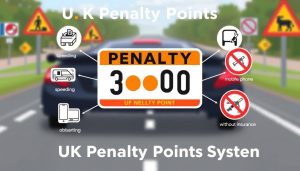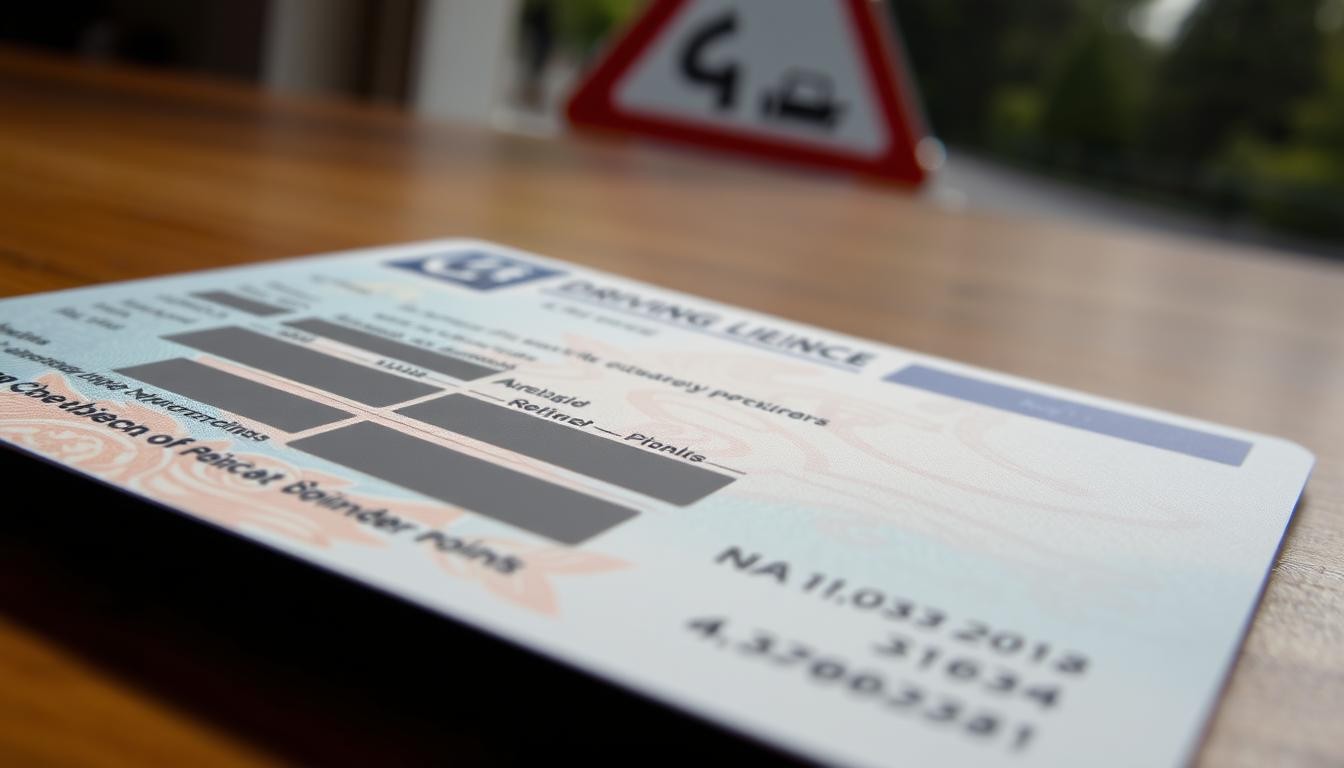Did you know that getting 12 or more penalty points on your UK driving licence in 3 years can lead to a driving ban? This fact shows how crucial it is to know about the UK’s penalty points system. It also tells us how long those 3 points can stay on your record. Let’s look into the details and see how this affects both new and experienced drivers.
Understanding the UK Penalty Points System

The UK’s penalty points system is key to keeping roads safe. It gives demerit points for breaking road rules. Knowing how it works helps drivers stay safe and avoid losing their licence.
- Types of Driving Offences and Point Allocations: The system covers many driving offences, each with its own points. Speeding can get you 3-6 points. Not showing your driver’s ID gets 6 points. Driving without insurance gets 6-8 points. These points aim to keep drivers safe.
- Impact on New and Experienced Drivers: New drivers face big penalties if they get 6 or more points in two years. This rule helps them learn safe driving. For experienced drivers, 12 points in three years can lead to losing their licence.
Fixed Penalty Notice Explained
Minor offences might get you a Fixed Penalty Notice (FPN). It lets you accept points and pay a fine without court. This makes it easier to deal with small infractions.
Knowing the UK’s penalty points system is vital for all drivers. It helps them follow the rules and avoid losing their licence. By driving responsibly, drivers stay safe and legal on British roads.
| Country | Demerit Point Thresholds | Disqualification Period |
| New South Wales, Australia | 12 points in 3 years | Disqualified |
| Victoria, Australia | 5 points in 12 months (learners/probationary) 12 points in 3 years (full license) |
3-month license suspension |
| South Australia | 12 points in 3 years | 3-5 months disqualification |
| Queensland, Australia | 4 points in 1 year (provisional/learner) 12 points in 3 years (open license) |
Varies based on points |
| Bulgaria | 39 points total | Not specified |
How Long Do 3 Points Stay on Your License UK?

- The penalty point system is essential to maintaining road safety in the UK.If you get 3 penalty points, you might wonder how long they’ll last. Knowing how long points stay on your licence is crucial for managing your driving record.
- Usually, 3 penalty points stay on your licence for 3 years from the conviction date. But, the points can’t be removed until 4 years after the offence. So, the points will show on your licence for 4 years, even though the penalty lasts 3 years.
- This system keeps drivers mindful of their actions for a long time. It also gives them a chance to improve their driving and get a clean record. This way, drivers are responsible for their actions but can also change for the better.
- Some driving offences, like drink-driving, can keep points on your licence for 11 years. It’s important to know the UK driving licence endorsement codes and points validity for your offence. This helps you understand the full impact of your driving mistakes.
- Knowing how long penalty points last helps drivers make better choices. It also helps them plan for the future. Points on your licence can affect your insurance, job chances, and more.
The Process of Receiving Penalty Points
The journey to getting penalty points on a UK driving licence starts with a Notice of Intended Prosecution (NIP). This document is sent to the vehicle owner, telling them of a suspected driving offence. After getting the NIP, the owner must fill out a Section 172 notice within 28 days. This notice says who was driving at the time of the incident.
If the Section 172 notice is accepted, a Fixed Penalty Notice is sent. It outlines the offence and the penalty points. These points are then added to the driver’s licence, starting from the date of the offence.
Timeline for Point Registration
The timeline for penalty point registration is clear:
- NIP (Notice of Intended Prosecution) is sent to the vehicle owner.
- Within 28 days, the driver must complete the Section 172 notice.
- If the Section 172 notice is accepted, a Fixed Penalty Notice is issued.
- Penalty points are then registered on the driver’s licence, effective from the date of the offence.
Knowing the steps helps drivers understand the UK penalty points system. It helps them keep their driving record clean.
| Offence | Penalty Points |
| Accumulating a total of 12 penalty points in any 3-year period | Usually results in a disqualification for at least 6 months |
| Driving under the influence of drink or drugs | Typically leads to a penalty of disqualification for a minimum of 12 months |
| Failure to stop and report an accident | Can result in at least 5 points being placed on the driver’s licence |
| Dangerous driving | Could include imprisonment, a ban of at least a year, and an extended retest requirement |
Keeping a clean UK driving licence is key. Understanding the UK driving penalty points calculator and following road rules is essential for all drivers in the United Kingdom.
Accumulation of Points and Consequences
In the UK, getting 12 or more penalty points in 3 years can mean a 6-month ban. But, courts might look at special cases to decide what to do.
New drivers face harsher penalties. If they get 6 points in 2 years after passing their test, they lose their licence. They must retake both tests.
- In the UK, using a mobile phone while driving can cost a learner driver six points.
- Points on a provisional licence stay when you get your full licence.
- After passing your test, you will lose your licence if you receive six or more points within two years.
Points stay on your licence from 4 to 11 years, depending on the offence. Behaviours like speeding or driving without insurance can lead to points. This can increase insurance costs and even take away your driving rights.
| Offence | Penalty Points | Consequences for New Drivers |
| Using a mobile phone while driving | 6 points | Potential licence revocation |
| Speeding | 3-6 points | Potential licence revocation for excess speeding |
| Driving without insurance | Minimum 6 points | Potential licence revocation |
| Careless or dangerous driving | 3-9 points | Potential disqualification rather than points |
| Failing to stop after an accident | 5-10 points | Potential licence revocation |
| Driving under the influence | Up to 11 points | Potential licence revocation |
- To avoid penalty points, new drivers in the UK must follow road safety rules. They should also follow the Highway Code and take professional driving lessons. This helps develop good driving habits.
- “Maintaining a clean driving record is crucial for new drivers in the UK, as even a single major offence can lead to the revocation of their licence.”
Speeding Offences and Point Bands
In the UK, speeding is split into three bands. These bands show how many penalty points and fines drivers might get. The severity of the speeding determines the band.
Band A, B, and C Classifications
- Band A: Speeding by 1-9 mph gets 3 penalty points and a fine of 25-75% of your weekly income.
- Band B: Speeding by 11-20 mph results in 4-6 penalty points and a fine of 75-125% of your weekly income.
- Band C: Speeding by 21 mph or more gets 6 penalty points and a fine of 125-175% of your weekly income.
Speed Camera Tolerances: UK speed cameras have a 10% plus 2 mph tolerance. This means they only start recording if you’re 10% over the limit plus 2 mph.
Fine Calculations Based on Weekly Income

- Fines are based on your weekly income. This makes the fines fair and meaningful for everyone. It’s not just about how much money you have.
- The UK’s speeding rules aim to keep everyone safe on the roads. They work to stop drivers from speeding too much. This contributes to everyone’s safety on the roadways.
Point Removal and Licence Rehabilitation
- Understanding the UK’s driving licence points system is key. It’s important to know how to remove points and get your licence back.
- Penalty points stay on your licence for 3 years. But, they can only be removed after 4 years from the offence.
- For minor driving offences, you can take a speed awareness course. This way, you avoid getting more points. It helps you learn more and become a safer driver.
- After the removal period, the points don’t count towards disqualification. But, they might still show on your licence for insurance reasons.
- This means you can keep your licence clean. A clean licence can help with your future driving history and insurance costs.
| Offence | Points Allocated | Point Removal Period |
| Speeding | 3-6 points | 4 years |
| Careless Driving | 3-9 points | 4 years |
| Using a Mobile Phone | 6 points | 4 years |
- By understanding the UK’s point removal process, you can keep your licence clean. This helps you avoid higher insurance costs or even losing your licence.
Special Considerations for Professional Drivers

For professional drivers in the UK, getting penalty points on their licences is a big deal. They need their driving skills to make a living. So, the UK’s points system affects them differently.
- Commercial Licence Implications: Drivers with commercial licences, like those for lorries or buses, face tougher rules. Even a few points can mean losing their job or being limited to certain vehicles.
- Employment Impact Assessment: Professional drivers are always being watched by their employers. Companies in transport check their driving records closely. A few points can threaten their job, leading to dismissal or limited tasks.
Insurance Premium Effects
- Penalty points can also hit professional drivers hard financially. Insurance costs for their vehicles go up, adding to their expenses. This can seriously affect their earnings, as they depend on their vehicles for work.
- Professional drivers in the UK must handle points and convictions carefully. Keeping a clean driving record is key for their jobs and financial future.
Legal Options and Appeals Process
Drivers in the UK can fight speeding charges by asking for a court hearing. This chance lets them defend themselves well and might keep points off their licence.
Reasons to appeal include proving it wasn’t speeding, wrong vehicle, or bad signs. To appeal, you need to fill out a form and might go to court. Getting legal advice is key, as it’s complex and you need to know the law well.
Those with a Single Justice Procedure Notice (SJPN) have 21 days to reply. If you don’t, you’ll be seen as guilty. Missing this deadline means you can’t say you’re not guilty or explain why you shouldn’t be fined.
- Prosecutors might not go ahead if you’re facing big personal problems, like serious money troubles or health issues.
- Companies can get SJPNs for things like wrong licences, just like people.
- Companies should get legal advice before saying how they plead.
- Asking for charges to be dropped because of special reasons should be done separately from replying to the SJPN.
This guide is for England and Wales only. Scotland and Northern Ireland have different rules.
| Offence | Penalty |
| Driving under the influence of drink or drugs | Disqualification for at least 12 months |
| Dangerous or careless driving | Imprisonment, minimum one-year ban, and an extended retest |
| Accumulating 12 penalty points in any 3-year period | Disqualification for at least 6 months |
| Failure to stop and report an accident | At least 5 points on a driving license |
Some people might get free legal help and advice through Legal Aid. If not, there are other ways to pay for legal services, like fixed fees or hourly rates.
Insurance Implications of Penalty Points

Having penalty points on your uk driver’s license can have a significant impact on your insurance. Points make a driver more risky in the eyes of insurers.This can lead to higher premiums that last up to 5 years, even though the points only stay on your licence for 3-4 years.
- Premium Increases: Accumulating penalty points usually means higher insurance costs. The exact increase depends on the points, the offence, and the insurer’s view. Drivers with 3 points might see a 5% rise, while 6 points could mean a 25% hike or more.
- Declaration Requirements: Drivers must tell their insurer about any penalty points. Not doing so can make the policy invalid, leaving you to pay for claims yourself. Insurers can check your record with the DVLA, so hiding points is not wise.
Long-term Financial Impact
The cost of penalty points goes beyond the fines and court fees. Over years, the higher insurance can cost thousands. This shows why driving safely and avoiding fines is crucial.
| Offence | Penalty Points | Insurance Impact | Financial Cost |
| Speeding | 3-6 points | 5-25% premium increase | £500-£2,500 over 5 years |
| Using a mobile phone while driving | 6 points | 25% premium increase | £2,500 over 5 years |
| Careless driving | 3-9 points | 10-40% premium increase | £1,000-£4,000 over 5 years |
The table shows how penalty points can affect insurance costs and your wallet over time. Remember, the exact costs can vary based on your situation and the insurer’s rules.
Conclusion
Understanding the UK’s penalty points system is key for all drivers. Points stay on licences for 3-4 years, leading to serious consequences if you get too many. By following traffic laws and knowing about speed cameras, drivers can keep their licence clean. This avoids financial and job problems.
It’s vital to know the penalties for drink driving, speeding, and other offences. Drivers need to know the alcohol limits, fines, and possible disqualification periods. This knowledge helps ensure safe and responsible driving.
Keeping a clean driving licence needs effort, awareness, and a focus on safe driving. By staying informed and making smart choices, drivers can avoid penalty points. This way, they can enjoy driving without worrying about money or legal issues.
FAQ
How long do 3 points stay on your licence in the UK?
Penalty points in the UK stay on your licence for 3 years from the conviction date. However, they can’t be removed until the 4th year.
What is the UK penalty points system?
The UK’s penalty points system punishes drivers for motoring offences. Getting 12 points in 3 years means a 6-month driving ban.
How are penalty points issued in the UK?
It starts with a Notice of Intended Prosecution (NIP) to the vehicle owner. They must fill out a Section 172 notice within 28 days. If accepted, a Fixed Penalty Notice is sent, and points are added to the licence.
What are the consequences of accumulating 12 or more penalty points in the UK?
Getting 12 or more points in 3 years leads to a 6-month ban. Courts might consider exceptions, like exceptional hardship.
How are speeding offences classified in the UK?
Speeding is divided into bands A, B, and C. Band A (1-9mph over) gets 3 points and a fine. Band B (11-20mph over) gets 4-6 points and a fine. Band C (21+mph over) gets 6 points and a fine.
Can penalty points be removed from a UK driving licence?
Points stay on your licence for 3 years but can’t be removed until the 4th year. You can take speed awareness courses for minor offences to avoid points.
How do penalty points affect professional drivers in the UK?
Professional drivers face harsher penalties for points. Commercial licence holders might lose their jobs, and insurance costs can skyrocket.
Can drivers contest speeding charges in the UK?
Yes, drivers can contest charges by asking for a court hearing. You can appeal if you prove you weren’t speeding, the vehicle was wrong, or the signs were bad.
How do penalty points affect insurance premiums in the UK?
You must tell your insurance about points, which can raise your premiums for up to 5 years. Not telling can make your insurance invalid.




